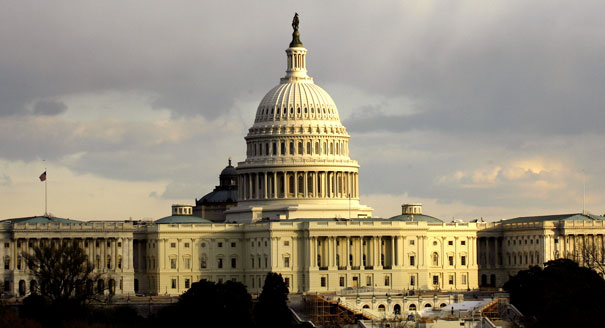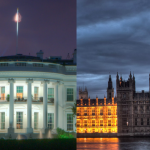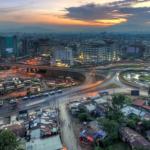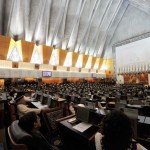US Government Shutdown: The Presidential System Sucks

The recent US Federal Government Shutdown has further proven to everyone around the World that the Presidential System is an extremely unreliable, buggy, flawed, and faulty system of government whose proneness to gridlock has turned it into a major embarrassment. In the Philippines, the proneness to gridlock of the Philippine Presidential System is precisely what spawned the Pork Barrel as a “solution” to avoid gridlock. We all know how that turned out… Isn’t it obvious that the Presidential System sucks?
First of all, the US Presidential System is all about gridlock: Gridlock between the Executive branch versus the Legislative branch, and within the Legislative branch – between the Upper Chamber (Senate) and the Lower Chamber (House of Representatives). This recent Federal Government Shutdown is a prime example of how gridlock happened between the Democrat-led Senate and the Republican-led House. And this gridlock is not about a law not getting passed. It’s about the US federal budget not getting approved. Without a budget and the funding government needs to keep running, the result is The Shutdown.
Everyone with a brain knows that Gridlock is bad. It’s a stalemate that means nothing happens. Some people even call it “deadlock.” Well, many Americans unfortunately tend to think that “gridlock is good.” Hard as it may be to understand, these Americans (and the American-wannabe Pinoys who emulate them) subscribe to the misguided view that gridlock is a positive feature because it was “meant to prevent bad leaders from doing much harm.” Yeah right.
It’s a rather lame idea because the fixation that these proponents of the gridlock-prone Presidential System have is on “preventing bad leaders from doing any harm”, when ultimately, their system also prevents good leaders from doing any good. Not only that, as the recent events have shown, it has resulted in the Shutdown. In a nutshell, the idea behind the defense of gridlock is based on the assumption that all leaders are up to no good. Quite unfortunately, many Americans (and many Filipinos who worship America and its system of government) seem not to have heard about how the Parliamentary System works. Instead of a system whose inherent susceptibility to gridlock is supposed to stifle a “bad leader” from doing harm, the Parliamentary System is premised on preventing bad leaders from emerging in the first place. In fact, the system works such that in the off chance that a bad leader does emerge, the so-called bad leader can be very easily removed and replaced legally without any difficulty whatsoever.
Is it any wonder that the USA is often bested by other First World Countries who use Parliamentary Systems in many performance indices?
Why is the USA never on top at number one?
This is not to say that the USA is not a rich country. It is a rich country. But it could have been richer and better-run. It could have performed way better than it currently performs on many international performance indices like the Economic Freedom Index, Transparency and Resistance to Corruption (Corruption Perceptions Index), GDP per Capita, Property Rights Index, Human Development Index, the Global Competitiveness Index, and many others.
Now let’s not forget what it is that actually helps make the USA rich and have a relatively self-driven population that is out to succeed despite its lousy and flawed gridlock-prone system of government: the USA is the World’s Largest Immigrant Nation.
Yup. That’s right. The USA has the largest immigrant-dominated population in the entire world. Majority of its people are themselves immigrants or at least descended from immigrants, and it continues to attract a lot of first generation new immigrants. And immigrants, particularly voluntary immigrants, are people who made the decision to be self-reliant and self-driven towards achieving economic independence for themselves and for their own families. They made their decision to be self-reliant even before leaving their original home countries to move to the USA.
(Another mitigating factor for why the USA, despite using the faultily-designed Presidential System, is still able to prevent the failures that have characterized Presidential Systems everywhere else is because their presidential system uses the Electoral College which helps to stabilize their electoral processes in lessening the number of contending candidates for the presidency. In countries in Latin America or in the Philippines which do not use the Electoral College, the high number of candidates often destabilizes the election results particularly in countries that do not use run-off elections in order to force the emergence of a majority president. This topic is discussed in “Problems of Presidentialism” by the late Dr. Fred Riggs.)
So even if the USA has a system that was rigged to “sabotage itself” through gridlock and get the least amount of work or “new policies” done, the fact that majority of Americans (who are mostly immigrants or descendants of immigrants) are still rather conscious of the need to be self-reliant mitigates the ill-effects of this institutionalized gridlock because the general psyche of voluntary immigrants is to “fend for themselves” anyway.
The Need for Good Governance in Developing Non-Immigrant Societies
On the other hand, in countries that are not immigrant nations, good governance is much more of a necessity. And ensuring that a country gets more-or-less the best kinds of leaders they can have generally means a better direction for them. Parliamentary Systems are meant to promote good governance. Of course they can’t guarantee it, but when compared to Presidential Systems, ceteris paribus, they obviously fare better in producing better-quality leaders. At the very least, the ideal scenario is that in such a society, excellent governance can and will emerge that will educate, train, and enable the people to become much more self-reliant so that ultimately, they’ll fend for themselves, be responsible to themselves as private individuals and not be too reliant on government.
In immigrant societies, voluntary immigrants made a conscious decision to be self-reliant even before setting foot into their intended destinations. They don’t really need to be taught to be self-reliant. Even with a government whose wings are clipped, self-reliant people (which is what immigrants normally are) can still succeed despite having an emasculated government as these people are self-motivated, driven, and out to achieve by themselves and for themselves. (However, it certainly does not harm when immigrant societies like Canada, Australia, New Zealand, or Singapore do have governments that are run well and are not clipped by gridlock. They certainly wouldn’t have to be sabotaged by a government shutdown like the one that has just recently hit the USA)
In non-immigrant societies, the people need to be molded and trained to become more attuned to the necessity of self-reliance. Why? Because the people there – “the natives” -have been in their home countries ever since. They’re “furniture that came with the house.” They didn’t decide to be there the way immigrants to new lands did. The people in non-immigrant societies need to be led to make the right moves towards success by good leaders. Good government (particularly good government whose ideas are based on Classical Liberal principles) can play this role of teaching the people to rely on themselves through education and creating an environment where hard work is rewarded and laziness is not rewarded. A gridlock-prone system, alas, will not allow this because it was designed to sabotage itself and clip its own wings. It’s very much like having the handbrake on while stepping on the accelerator.
As the Philippines is clearly not an immigrant society, it is quite obvious that our country desperately needs good governance and a system that prevents bad leaders from emerging in the first place, as well as hopefully enables good leaders to step up to the plate and train, mold, and enable a vast majority of the people to become successful, self-reliant, achievement-oriented citizens who can stand on their own economically. This is what a Parliamentary System is more likely to do than a Presidential System since Parliamentary Systems cause competent leaders to emerge, while Presidential Systems are more likely to cause “winnable” and “popular” (but not necessarily competent) leaders to emerge. The absence of gridlock in Parliamentary Systems means that shutdowns like the one hitting the USA are generally absent and leaders are empowered to do what they need to do in order to do the right things and pursue much-needed reforms.
(Australia is the only Parliamentary country to have formally had one and only one shutdown and it was very promptly resolved within a few hours thanks to the flexibility of the parliamentary system. Ironically, the reason why Australia had a shutdown in 1976 is a result of Australia’s decision to copy the USA in creating a relatively powerful elected Senate – emulating the US Senate – which ended up in gridlock against Australia’s slightly more powerful House of Representatives. Unlike Australia which had only one shutdown ever which happened in 1975 and it was only for a few hours, the USA has had a total of 17 government shutdowns, the last one was 17 years ago as of this writing and each of them lasted for days or even weeks! Shutdowns are unfortunately a “feature” of the US System. While the stability of Presidential Systems would be akin to operating systems that crash regularly, Parliamentary Systems are – to IT professionals’ and computer scientists’ eyes – reminiscent of heavy duty fault tolerant and crash resistant operating systems.)
Sadly, with the Philippines using a Presidential System, our country is likely to be forced into two extremes: Either a highly corrupted Pork Barrel-dependent system that uses such funds to prevent Gridlock or an extremely gridlock-prone system (if Pork Barrel is abolished but the Presidential System remains) which is prone to impasses, coups d’etat (like in Latin America) and government shutdowns no different from what the USA is experiencing at the time of this writing.
The choice is clear: The Presidential System must go. The Philippines has had its Pork Barrel scam which is ultimately traceable to the presidential system’s gridlock-prone separation of powers, while the US Federal Government Shutdown shows another ugly side of how gridlock can turn out. Surely, the benefits of shifting over to the Parliamentary System is becoming more and more easy to understand, and the urgency of making such a shift has become very obvious. Americans, your Founding Fathers were not infallible. The Presidential System they came up with is not perfect and how it works is essentially responsible for the gridlock inherent in the US system which in turn caused this US Government Shutdown. If you want to stay on using your gridlock-prone & susceptible to shutdowns system, go ahead and continue using it, but please don’t push it on others.
Filipinos, if we are serious in wanting to truly improve our society, it’s time to shift to the Parliamentary System!
* * *
About the Author
 Orion Pérez Dumdum comes from an IT background and analyzes the Philippine situation the way he analyzes IT systems: logically and objectively.
Orion Pérez Dumdum comes from an IT background and analyzes the Philippine situation the way he analyzes IT systems: logically and objectively.
Being an Overseas Filipino Worker himself, he has seen firsthand how the dearth of investment – both local and foreign – is the cause of the high unemployment and underemployment that exists in the Philippines as well as the low salaries earned by people who do have jobs.Being Cebuano (half-Cebuano, half-Tagalog), and having lived in Cebu, he is a staunch supporter of Federalism.
Having lived in progressive countries which use parliamentary systems, Orion has seen first hand the difference in the quality of discussions and debates of both systems, finding that while discussions in the Philippines are mostly filled with polemical sophistry often focused on trivial and petty concerns, discussions and debates in the Parliamentary-based countries he’s lived in have often focused on the most practical and most important points.
Orion first achieved fame as one of the most remembered and most impressive among the winners of the popular RPN-9 Quiz Show “Battle of the Brains”, and got a piece he wrote – “The Parable of the Mountain Bike” – featured in Bob Ong’s first bestselling compilation of essays “Bakit Baligtad Magbasa ng Libro ang mga Pilipino?” He is the principal co-founder of the CoRRECT™ Movement and spearheads the campaign to inform the Filipino Public about the urgent need for Constitutional Reform & Rectification for Economic Competitiveness & Transformation.
* * *
Extra reading on the US Federal Government Shutdown:
1. The Shutdown is the Constitution’s Fault by Dylan Matthews (Washington Post)
2. Government Shutdown: Is it George Washington’s Fault? by Peter Gier (CS Monitor)
3. The Founding Fathers’ Fiscal Crisis Mistake by Peter Singer (Project Syndicate)
4. Why a Government Shutdown Couldn’t Happen in Canada by Bert Archer (Random House of Canada)
5. How Australia dealt with the One Gov’t Shutdown they experienced by Max Fisher (Washington Post)
6. Why Other Countries Don’t Have Shutdowns by Joshua Keating (Slate)
7. Why Other Countries Don’t Shut Down their Governments by Peter Weber (The Week)
* * *
You might also like these articles by Orion Pérez Dumdum:
1. Chicken or the Egg: Culture Change or System Change?
2. Why Charter Change is CoRRECT™
3. Philippine Progress: Shift in Sports, Shift in System
4. Senator Pangilinan and the Parliamentary System
5. The Parliamentary System Fits the Philippines
6. Two Filipinos: A Football Legend & A Spanish Prime Minister
7. Eight Points in Enlightening the Élite
8. F to A: What P-Noy Needs to do in order to Succeed
















 I believe: This is a CoRRECT™ Video with a very positive message
I believe: This is a CoRRECT™ Video with a very positive message Walang Natira: Gloc-9's MTV Rap about the OFW Phenomenon
Walang Natira: Gloc-9's MTV Rap about the OFW Phenomenon




















